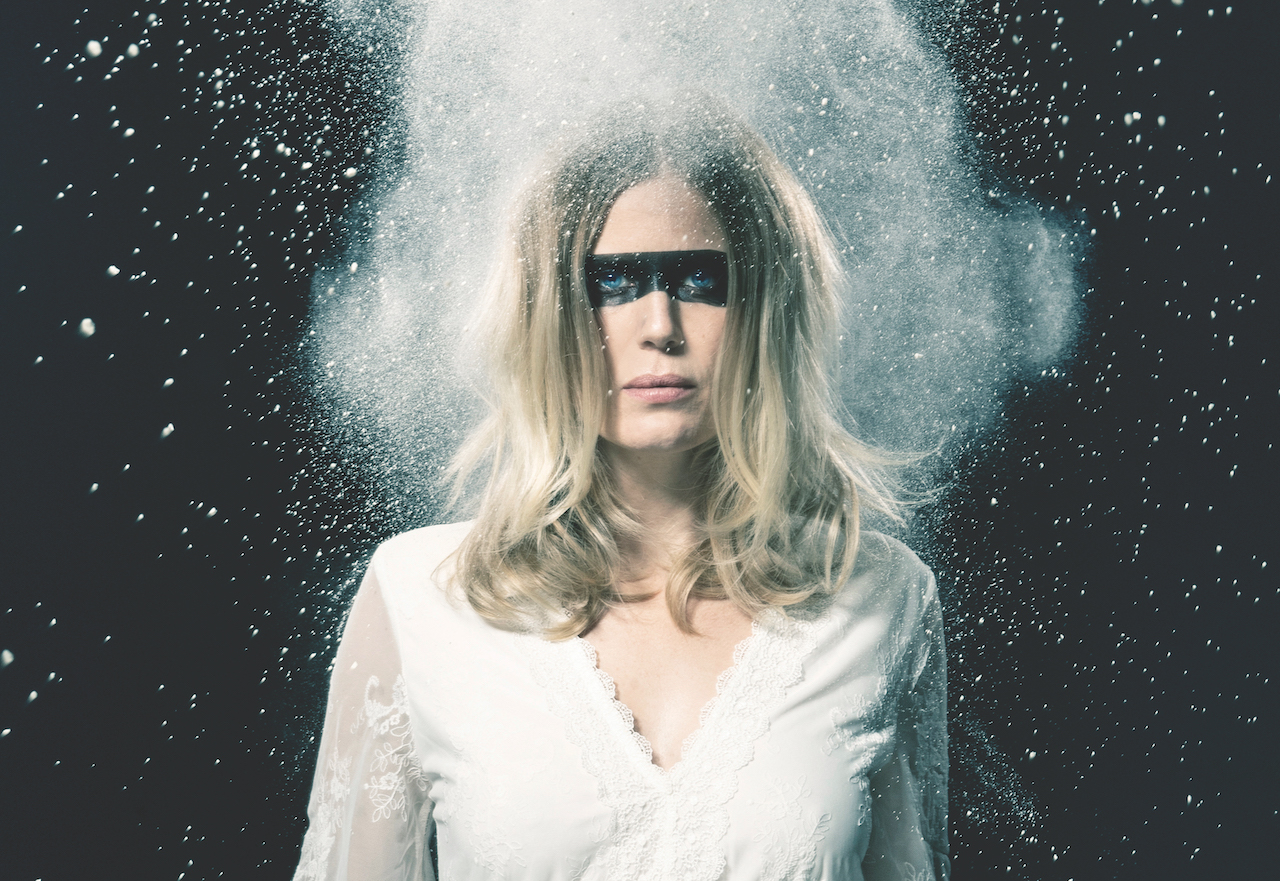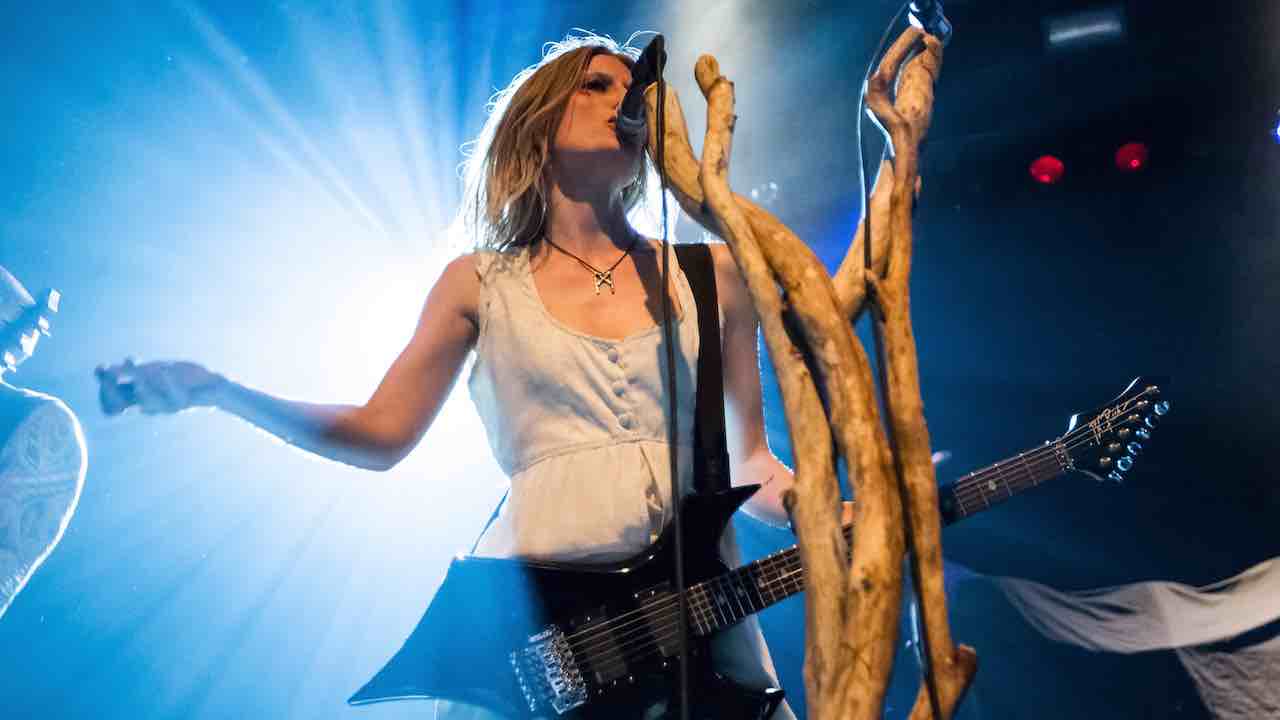An old painting hangs on the wall of the compact, one-storey house an hour’s drive out of Copenhagen that Amalie Bruun calls home. It depicts a blonde girl lost in reverie as she walks a grass path high above a fjord: a scene that’s elemental and ethereal at the same time.
The picture, by noted Norwegian landscape artist Hans Dahl, belonged to Amalie’s late grandmother, a refined woman who smoked cigarettes from an ivory holder and drank gin and tonic on a Friday morning. Amalie’s mother used to say that it was Amalie in the painting. It’s not hard to see why.
“I had a connection to it from before I can remember,” says Amalie today, as we sit at a dining table in a living room that’s one part uncluttered Scandinavian stylishness, one part hygge-style cosiness. “The album sounds like the painting looks.”
The album she’s referring to is Folkesange, her third as Myrkur, the one-woman project she founded in the mists of the early 2010s.
Where Myrkur’s past releases have bridged worlds – black metal, post-rock, blackgaze, classical – Folkesange is different. This is traditional Scandinavian music played on traditional Scandinavian instruments, sung predominantly in Danish. There are some covers, some originals, though there’s not a trace of metal in the music or the vocals. It’s all there in the title: Folkesange. Folk Songs.
That Amalie Bruun is releasing an album of sometimes beautiful, sometimes melancholic Scandinavian folk music really shouldn’t surprise anyone who has followed her journey. Partly because that aspect of who she is has always been present in Myrkur’s music – all she’s doing with Folkesange is separating it out.
But mainly because Amalie Bruun has lived more lives than most other people. That, as much as anything, is what puts her out there on her own.

Two life-changing things have happened since Myrkur’s last album, 2017’s expansive and brilliant Mareridt, both inextricably linked.
One: Amalie Bruun got married. Her husband, Keith Abrami, is a fitness instructor and drummer with American death metal band Artificial Brain. The pair became romantically involved after Keith began playing as Myrkur’s touring drummer.
Keith is around, though he stays in the back bedroom today. This is because he is attending to the second life-changing thing that has happened to Amalie recently: the couple’s nine-week old son, Otto.
If Mareridt was the product of the vivid nightmares its creator endured before making it, Folkesange was defined by pregnancy and the impending birth of her first child.
She describes motherhood as joyous, though in her case the elation is edged with sadness. She discovered she was pregnant soon after she started writing the new album. “But I miscarried,” she says simply.
We ask if she’s OK talking about this. She nods, and explains that the miscarriage pushed her deeper into making Folkesange. A few days after entering the studio with producer (and Heilung co-founder) Christopher Juul, she discovered she was pregnant again. And that’s when the emotion really hit her.
“I was totally out of it, but in a beautiful way,” she says. “I wasn’t my normal human self. I become something else.” She laughs. “Very nauseated.”
She noticed that her vocals were different. “I never felt so in tune with singing as I did then. I had this power and this clarity, which was crazy. But it was the exact place to be, recording folk vocals with this new life growing in you.”
There were worries, of course, as well as other emotions. One of the songs on the new album, Gudernes Viljie (English translation: ‘The Will Of The Gods’) is about the miscarriage. “There were conflicted feelings, dealing with both this new life and this guilt feeling of this other life that never happened,” Amalie explains. “It was never a heartbeat, but you still feel like a mother. It was very intense.”
Amalie Bruun grew up listening to Scandinavian folk music. It resonated with her on a different level. “With my spirit,” she says. “It’s like in England: you have that singer-songwriter folk tradition, it’s historically ingrained. It shapes who you are, even if you don’t know it. Because it’s folk music, it’s told by people for people. So it’s inherited into the spirit of a population.”
Half of Folkesange’s 12 tracks are her versions of songs that she grew up listening to, while the others are her originals, though you’d be hard pushed to tell which is which. “This is a record that I wish had existed when I was young,” she says. “And it doesn’t exist, so I wanted to make it.”
Music, folk or otherwise, is in her blood. Her father, Michael Bruun, is a retired musician. He was semi-famous as a pop singer-songwriter in Denmark in the early 80s. “But he was not interested in fame,” says Amalie. “He’s shy and misanthropic.” Does she take after him? She smiles. “I do. Sometimes I wish I didn’t but I do.”
Her mother, by contrast, was a Jungian psychologist. “She tried her best not to bring her work home, but she did. You get analysed every day.”
As well as folk music, Amalie loved classical music as a child. She learned piano as a toddler, took up violin at five, and eventually attended music college as a teenager. “I wasn’t pushed into anything. It was all my choice. I was never interested in anything else.”
The first metal record Amalie Bruun fell in love with was Transilvanian Hunger, Darkthrone’s sub-lo-fi black metal masterpiece. Before that she’d listened to the stuff teenagers listen to: Nirvana, Björk, that kind of thing. Aside from her older brother’s Metallica and Judas Priest records, she’d never listened to much metal.
“Usually that transition takes years, right?” she says. “But all of a sudden I hear Transilvanian Hunger. It reminded me of classical music.”
“The Starter Pack” is how she jokingly describes Transilvanian Hunger today. “If you like that, a lot other black metal sounds really pleasant. A lot easier on the ear.”

When she was 22 years old, Amalie Bruun bought herself a one-way plane ticket to New York and started another life. It was the city’s rich and romantic musical history that drew her there: the poets, the punks, the freaks, the superstars.
She arrived with no cellphone and nowhere to stay. “I didn’t know what I was doing,” she says. “But that’s what New York is. You just go there and see what happens.”
She found a place to stay with friends of friends from back in Denmark, and walked all over the city, giving her demo CD to venues. “Just piano music,” is how she describes what she was doing. “Me singing little melodies.”
She played anywhere that would have her, in front of whatever crowds were there. “Oh, it wasn’t the cool people,” she says. “It was definitely uncool. But it was never about fame. I just wanted to go out and earn my stripes a little bit.”
In the early 2010s, she met guitarist and co-vocalist Brian Harding, and they put together Ex Cops. Based in oh-so-trendy Brooklyn and playing shoegaze-inflected alt-pop, they basically screamed ‘hipster’.
She recoils at the suggestion. “I fucking hate that,” she says vehemently. “I hate the whole hipster thing.”
Ex Cops were ultimately small fish in a big indie rock pond – their main claim to fame was that their second album was executive-produced by Smashing Pumpkins major domo Billy Corgan. Amalie liked being in Ex Cops, but she liked the music industry a lot less. Or at least the part of it she where she found herself.
“I would be in the studio, working on ideas I had written and people would say, ‘Let’s just let Amalie get it out of her system,’” she says. “I was so offended by that. There were comments on what I would wear, whether or not I could have armpit hair in photos. It takes away your agency as a musician and as a woman.”
There were two Amalie Bruuns while she was living in New York. Or rather, there was one living two separate lives.
There was one Amalie Bruun who was making music with Ex Cops and dipping her toes into the world of modelling – she appeared, raven-haired, in a Chanel advert directed by the legendary Martin Scorsese – and, even more bizarrely, alongside 90s crooner Michael Bolton dressed as Forrest Gump in a video by spoof R’n’B group The Lonely Island (Bolton was dressed as Forrest Gump, not her).
Then there was Amalie Bruun the black metal fan. She mentioned her love of the genre in Ex Cops interviews, even if she sounded almost apologetic about it. “I was,” she concedes. “People thought it was too weird.”
Few people picked up on the references anyway, let alone knew that she was quietly working on a project of her own in the shadows: Myrkur.
She had been writing folk melodies on the violin for years. Gradually she added more and more metal elements. Once in a while she dared play it to other people.
Eventually word reached underground metal stronghold Relapse Records, who released her self-titled debut mini-album in 2014. Back then her identity was a mystery: she was as much apparition as musician. “I wanted the music to speak for itself,” she says of her anonymity, as if it’s the most obvious thing ever.
But mysteries don’t stay mysterious for long these days. When someone joined the dots and uncovered her other life as one half of a trendy Brooklyn indie-pop band, the keyboard warriors went into swivel-eyed overdrive. She was a fake. A poser. Worse, a woman – one who’d dared gatecrash the testosterone-heavy sausage party that is the black metal scene.
“I was blissfully unaware of it,” she says of the negative attention she initially attracted. “Then it was, like, ‘Why am I being hated by people who don’t know me at all. At least get to know me.’” She shrugs. “It didn’t affect me much. I was there to play music, not fuck around with all that stuff.”
She has a theory: that people objected to the fact that she’d worked with Kris ‘Garm’ Rygg, frontman with former black metal avant-gardists Ulver. “Honestly, what really pissed off a lot of people in the beginning was that I did work with some of the Scandinavian black metal artists that they look up to. I think that was very annoying and provocative to that crowd.”
Not that she was a woman? She thinks carefully.
“I think it’s the fact that I didn’t follow the rules of how women in metal should behave. I’m not the first woman in metal, I just did it a little bit more my own way.”
Anyway, she says with a faint smile, she wasn’t above a little button-pushing herself.
“I was never deliberately provocative,” she begins. “But when I realised how little it took I did take a bit of pleasure in it. I knew that if you post a picture with Attila from Mayhem, then they’re just going to go off. But it’s not like I did that just to piss people off...”
If Mareridt silenced the haters, or some of them at least, then Folksange, with its absence of volume, will probably fire them up again. Amalie Bruun couldn’t care less if it does. She has more important concerns. Such as her new life, as the mother of Otto.
She’s not pretending that motherhood won’t impact on how she approaches her career. There will be no big world tours around Folkesange, for one. “You can’t pretend it doesn’t play into it as a woman. Maybe as a man, it’s different. I know a lot of metal musicians, they have kids and they continue the same life. That’s cool, but when you’re a mother you can’t do that. I want the two sides of my life to co-exist.”
Has she worked out how that will work?
“I don’t know yet how that works.”
Is she looking forward to it?
“It’s nerve-wracking.”
Is she worried?
“No, I’m not worried. I’m in control. It will be how I plan it to be.”
With perfect timing, the sound of a baby crying drifts from the back room. Amalie gets up and returns a few seconds later holding Otto, a tiny bundle of nine-week-old humanity.
It’s only then that you realise how unique Amalie Bruun, and Myrkur, is: not just a woman operating in such a male-dominated field, but a mother as well.
Before we leave her and her family, she says that she’s looking forward to following up Folksange with “another metal-style record with distorted guitars”. But for now that’s in the future. Another chapter, another life.
Originally published in Metal Hammer #330

